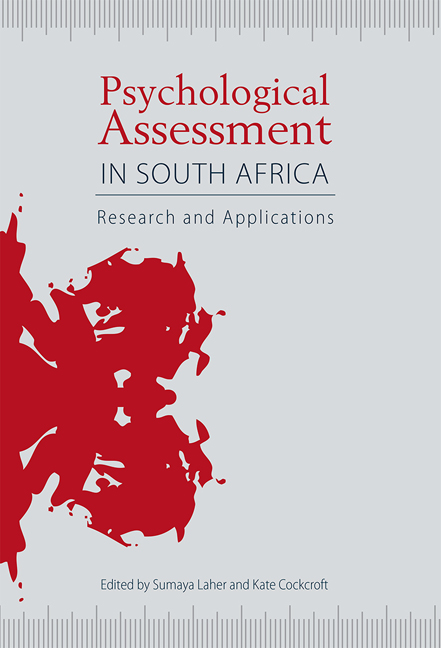Book contents
- Frontmatter
- Contents
- Tables and figures
- Acknowledgements
- Acronyms and abbreviations
- 1 Contextualising psychological assessment in South Africa
- Section One Cognitive tests: conceptual and practical applications
- Section Two Personality and projective tests: conceptual and practical applications
- Section Three Assessment approaches and methodologies
- 28 Ethical perspectives in assessment
- 29 Using computerised and internet-based testing in South Africa
- 30 The ImPACT neurocognitive screening test: a survey of South African research including current and projected applications
- 31 A family consultation model of child assessment
- 32 Qualitative career assessment in South Africa
- 33 Psychological assessment and workplace transformation in South Africa: a review of the research literature
- 34 Assessment of prior learning: a South African perspective
- 35 Large-scale assessment studies in South Africa: trends in reporting results to schools
- 36 Current and future trends in psychological assessment in South Africa: challenges and opportunities
- Contributors
- Index
31 - A family consultation model of child assessment
from Section Three - Assessment approaches and methodologies
Published online by Cambridge University Press: 21 April 2018
- Frontmatter
- Contents
- Tables and figures
- Acknowledgements
- Acronyms and abbreviations
- 1 Contextualising psychological assessment in South Africa
- Section One Cognitive tests: conceptual and practical applications
- Section Two Personality and projective tests: conceptual and practical applications
- Section Three Assessment approaches and methodologies
- 28 Ethical perspectives in assessment
- 29 Using computerised and internet-based testing in South Africa
- 30 The ImPACT neurocognitive screening test: a survey of South African research including current and projected applications
- 31 A family consultation model of child assessment
- 32 Qualitative career assessment in South Africa
- 33 Psychological assessment and workplace transformation in South Africa: a review of the research literature
- 34 Assessment of prior learning: a South African perspective
- 35 Large-scale assessment studies in South Africa: trends in reporting results to schools
- 36 Current and future trends in psychological assessment in South Africa: challenges and opportunities
- Contributors
- Index
Summary
Innovative assessment procedures, which take into account contextual factors such as language, culture, education, socio-economic status and recent educational policy developments, are needed in South Africa. In the democratic South Africa, Education White Paper 6 (Department of Education, 2001) calls for assessment practices that are less expert-driven, non-deficit-focused and linked to curriculum support. The Initial Assessment Consultation (IAC) approach, which is the focus of this chapter, encompasses and attempts to address these needs. This shared problem-solving approach to child assessment has at its core a focus on collaboration with parents and caregivers, as well as with significant others such as teachers, with the purpose of facilitating learning and the empowerment of clients. The approach is based on a sound philosophical and theoretical foundation and is a departure from the belief that assessment and intervention are discrete clinical procedures.
The IAC approach to child assessment, which represents a paradigm shift in assessment practice, was initially developed by Adelman and Taylor (1979) at the Fernald Institute at the University of California to address prevailing criticisms of conventional assessment procedures. For more than two decades, the IAC family participation and consultation model of assessment has been adapted and implemented at the University of the Witwatersrand. The key principles of the IAC approach are applied by many local professionals and training institutions that work within the assessment, remedial and educational fields. Research has supported the usefulness of this holistic and egalitarian form of assessment (Amod, 2003; Amod, Skuy, Sonderup & Fridjhon, 2000; Levin, 2003; Manala, 2001; Skuy, Westaway & Hickson, 1986; Warburton, 2008), which mirrors the more democratic environment of post-apartheid South Africa, with its endorsement of human rights, its sensitivity towards cross-cultural differences and its changing educational policies on assessment practice.
Background to the IAC approach
The IAC model provides an optimal and broad framework for assessment practice. Adelman and Taylor (1983; 1993; 2010) reject the reductionist view of behavioural, emotional and learning problems as reflecting internal deficits and pathology within the individual.
- Type
- Chapter
- Information
- Psychological Assessment in South AfricaResearch and Applications, pp. 461 - 473Publisher: Wits University PressPrint publication year: 2013



